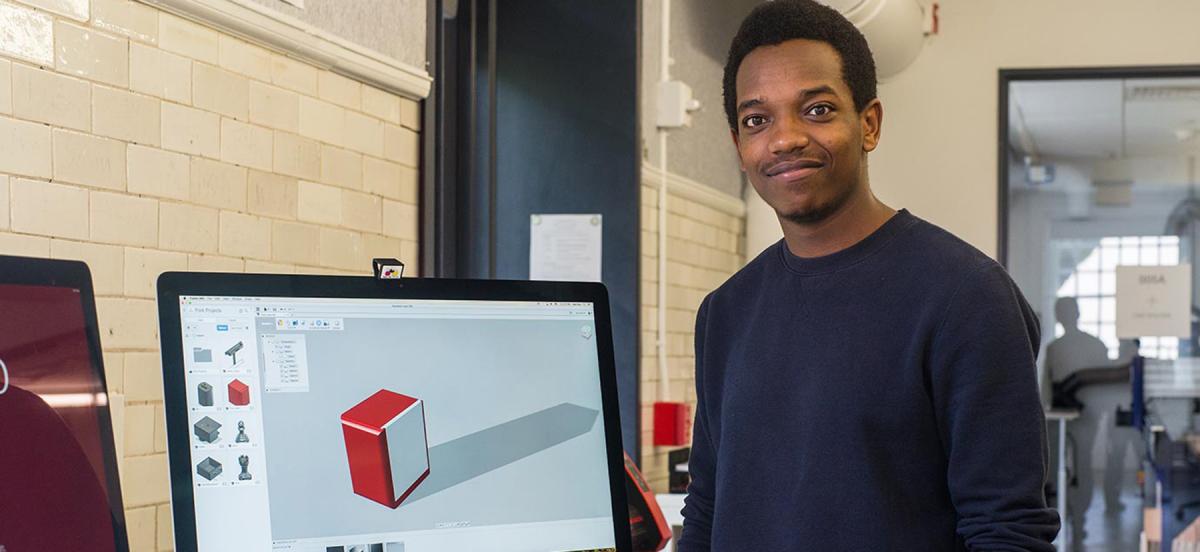Ken Ruto ’20 Named Second Runner-Up in Cisco Global Problem Solver Challenge

Ken Ruto '20 shows off some of the software elements of Flux, his smart water meter for improving Kenya's water-delivery system. Photo by Patrick Montero.
Details
The computer science major received $25,000 to support the development of Flux, a smart water meter designed to improve water systems in his home country of Kenya.
For Ken Ruto ’20, the idea to streamline the water-delivery system in Kenya took root in a Haverford classroom. In his first-year writing seminar, “Finding a Voice: Identity, Environment, and Intellectual Inquiry,” the computer science major discovered the potential to solve simple social problems with technological intervention. This discovery, coupled with his connection to his hometown of Nakuru, led to the development of Flux, a smart water meter that allows for the tracking of utility losses in order to make the water system more efficient.
"What really inspired Flux is the fact that growing up in Kenya I don’t remember a single month where we had a consistent water supply,” said Ruto. “Sometimes this would go on for days, even weeks. To cope, my family and millions of other Kenyan are often forced to buy water from unscreened vendors, which is not only expensive, but sometime posed health and sanitation risks. I realized that one of the main reasons why we’d experience frequent water rationing was because up to 50% of all the water released by water utilities gets lost even before it reaches consumers due to our aging analog water system.”
Enter Flux: an affordable smart water tracking system designed by Ruto and his brother, Denis, to work with Kenya’s unique infrastructural needs with minimal integration costs.
"Flux was conceived to address the issue of our aging old water system that contributes to a lot of water being lost before reaching end consumers and the lack of an affordable way to track and prevent these losses,” he said. “For the first time, water-service providers will have the ability to detect leaks and theft in real time, cut down all the physical water losses, and proactively ensure that all the water they release reaches end consumers.”
"As a result,” he continued, “this goes a long way in improving water service delivery to the millions of Kenyans, my family included, that rely on these water service providers as a source for affordable, safe, and consistent water and sanitation.”
After hours spent in the VCAM MakerSpace using 3D modelling software to make digital drawings for the Flux prototype and attending Design Thinking Workshops hosted by the Haverford Innovations Platform (HIP), Ruto and his brother sought out the annual Cisco Global Problem Solver Challenge as an opportunity to take Flux to the next level. The contest offers over $300,000 worth of prize money to students and recent graduates who have created innovative technical solutions to help solve some of the world’s most pressing social and environmental problems.
"I thought the Cisco Challenge presented a wonderful opportunity to not only challenge myself, but was also an excellent chance to connect and learn from other people from other amazing teams as well as connect with industry professionals working at Cisco,” said Ruto.
Ruto’s hard work paid off—literally. As a second runner-up in Cisco’s contest, Flux earned a $25,000 prize to support the project’s continued growth.
"We plan on using the funds to facilitate our first pilot with a small water-service provider partner based in Nairobi, Kenya, by the end of the fall,” he said.
As part of this pilot program, Ruto plans to put 50 Flux devices into 50 homes in order to garner consumer feedback on the product. He intends to make Flux software and products available to both public and private water utilities in Kenya in the future.
Ruto’s development of Flux has continued to grow this summer, as the rising junior joined HIP’s inaugural Innovation Incubator alongside fellow computer science majors Ahmed Ishtiaque ’20 and Vincent Yu ’20 to further “Dibs,” a new sustainability-oriented app.
"I am continuing to learn to develop software tools for Flux,” he said of his summer in the incubator program. “Over the course of the program, I did a lot of web development, which has gone a long way in helping me learn a lot of new concepts and becoming better as a developer. In the near future, I see myself continuing working on Flux, more specifically on the software end, and becoming involved in social-themed projects that specifically aim to solve social problems, especially in underserved communities.”



